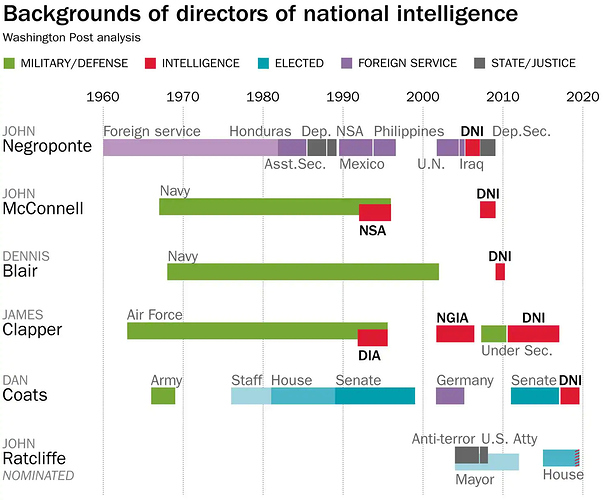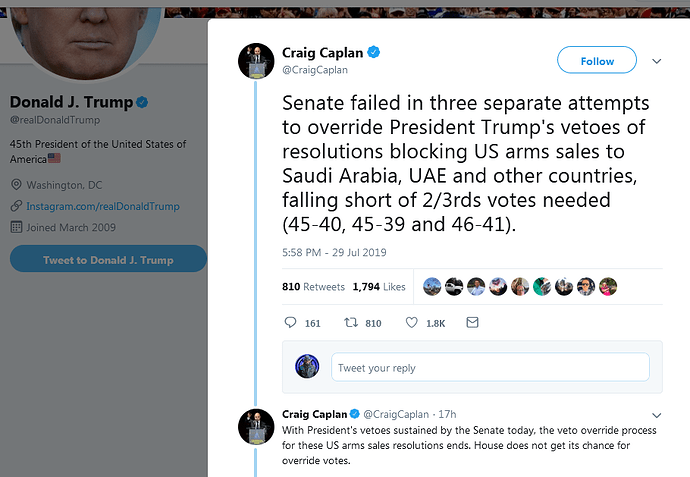The position of director of national intelligence is a relatively new one, created in 2004 after the terrorist attacks of Sept. 11, 2001. The idea was to better consolidate intelligence gathering and sharing by creating a Cabinet-level position responsible for intelligence across government agencies, from the CIA to the Defense Intelligence Agency to the intelligence arms of the armed forces.
The first person to hold the position was John Negroponte, who took over in 2005. He already had more than four decades of government service under his belt, including time as ambassador to various countries and working for the National Security Agency. He was followed by directors with similarly lengthy résumés, either working for the military or, as in the case of the current director, Daniel Coats, in Congress.
Over the weekend, President Trump announced that Coats was leaving the position. In his stead, Trump will nominate Rep. John Ratcliffe (R-Tex.), who’s been in Congress since 2015. Ratcliffe attracted Trump’s attention by vigorously defending the president as the investigation into Russian interference in the 2016 election has unfolded.
Beyond that important-to-Trump qualification? Ratcliffe’s résumé is unusually thin.
As noted above, Negroponte spent decades in the Foreign Service and served as ambassador to Honduras and Mexico before the 2001 attacks. After the attacks, he was ambassador to the United Nations and, after the 2003 invasion, Iraq. He served as assistant secretary in the State Department in the late 1980s and, after that, as deputy to then-national security adviser Colin L. Powell.
Negroponte was succeeded as DNI by John McConnell . McConnell served in the Navy for decades, including in senior intelligence roles for more than two decades. He achieved the rank of vice admiral. In 1992, he became the head of the NSA, a position he held for four years. After leaving government, he worked in the private sector focused on intelligence issues. He was confirmed as DNI and served for a bit under two years.
McConnell was followed by Dennis Blair , another career Navy man. When he left the armed services, he was the commander in chief of Pacific forces. After leaving, he held a number of academic and think-tank roles focused on national security issues. He was appointed DNI by President Barack Obama and served for a bit more than a year before being dismissed.
Next came James R. Clapper Jr. , the person who held the position for the longest period to date. Clapper served in the Air Force for several decades, focused on intelligence work. He became head of the Defense Intelligence Agency at the end of his tenure in the military. After briefly working in the private sector, he became the head of the National Geospatial-Intelligence Agency, which is under the oversight of the Office of the Director of National Intelligence. After joining the Defense Department as undersecretary for defense, he was appointed by Obama to replace Blair and served until the end of Obama’s presidency.
Coats took a different path, first serving as a staff member to former representative from Indiana Dan Quayle. When Quayle was elected to the Senate, Coats took his House seat; when Quayle became vice president, Coats replaced him in the Senate. After leaving the Senate, he became ambassador to Germany and, for a period, worked in the private sector. He was elected to the Senate again in 2010 and was tapped by Trump to serve as DNI after deciding against running for reelection.
Then there’s Ratcliffe. Much of his professional career has been spent as an attorney, including service with the Justice Department for about five years, first focusing on anti-terrorism work in East Texas and, later, as U.S. attorney for that region. During that time, he also served as mayor of Heath, Tex., a town of about 7,000 just east of Dallas. In 2014, he was elected to the House. When the current Congress began in January, he took a position on the House Intelligence Committee.
Again, Trump’s interest in Ratcliffe reportedly stems not from his robust background in intelligence operations and organizations but, at least in part, from his willingness to advocate Trump-friendly rhetoric about the Russia investigation.
So let’s summarize Ratcliffe’s résumé in its entirety as he applies for the top intelligence position in the nation:


